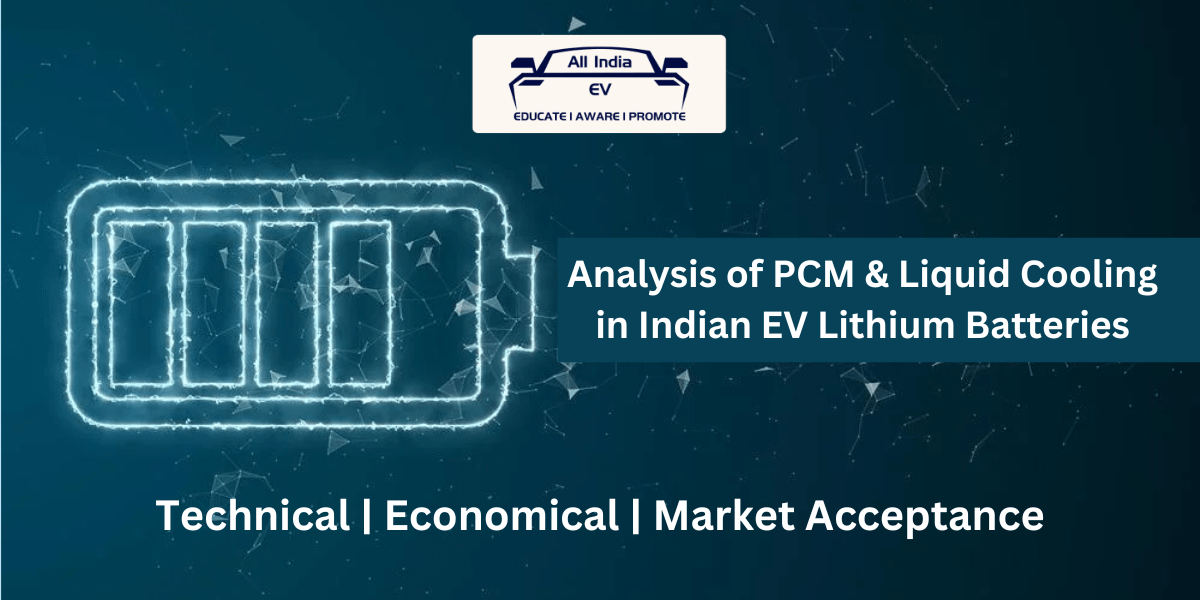
Technical Analysis of PCM and Immersion Liquid Cooling in Lithium Batteries for the Indian EV Market
The growing electric vehicle (EV) market in India is poised to revolutionize the automotive landscape, driven by increasing consumer demand and supportive government initiatives.
At the heart of this transformation lies the need for efficient and reliable battery systems, which are critical for the performance and safety of EVs. Effective thermal management of lithium-ion batteries is a pivotal aspect influencing their longevity and operational efficiency.
Two advanced cooling technologies, Phase Change Material (PCM) and immersion liquid cooling, have emerged as promising solutions to address the thermal challenges associated with EV batteries.
This article delves into the technical and economic aspects of PCM and immersion cooling technologies, analyzing their potential impact on the Indian EV market and highlighting key players in this innovative field.
Technical Analysis
Phase Change Material (PCM):
PCM technology utilizes materials that absorb and release thermal energy during melting and solidifying. This characteristic helps maintain battery temperatures within optimal ranges without external power.
Key Technical Aspects of PCM:
🔹Thermal Conductivity: High thermal conductivity in PCM facilitates efficient heat dissipation. This is crucial in preventing thermal hotspots within battery packs.
🔹Melting Temperature: The melting temperature of PCM should align with the desired operating temperature range of the battery. This ensures heat absorption when temperatures rise and heat release when they fall.
🔹Latent Heat: High latent heat capacity allows PCM to absorb significant thermal energy during phase transition, effectively regulating battery temperature.
🔹Cycle Stability: PCM must withstand numerous heating and cooling cycles without degrading, ensuring long-term reliability.
🔹Compatibility: PCM should be chemically inert to prevent reactions with battery components, thereby avoiding corrosion and performance degradation.
Paraffin waxes, hydrated salts, and metallic PCMs are commonly used due to their favorable thermal properties and compatibility with battery materials.
Immersion Liquid Cooling:
Immersion cooling involves submerging battery cells in dielectric fluids, which directly absorb and transfer heat away from the cells. This method offers superior cooling performance compared to traditional air and liquid-cooled systems.
Key Technical Aspects of Immersion Cooling:
🔹Dielectric Fluids: These fluids, such as mineral oil and engineered coolants, are non-conductive, preventing electrical shorts while efficiently transferring heat.
🔹Cooling Efficiency: Direct contact with battery cells allows for rapid heat dissipation, maintaining uniform temperature distribution.
🔹Design Flexibility: Immersion systems can be designed to accommodate various battery configurations, enhancing their applicability across different EV models.
🔹Safety: Immersion cooling reduces the risk of thermal runaway, a critical safety concern for lithium-ion batteries.
Experimental studies have shown that immersion cooling effectively mitigates temperature rise during high power operations and fast charging conditions.
Economic Analysis
Cost Considerations:
The implementation of PCM and immersion cooling systems involves initial setup costs, including the materials and design modifications. However, these costs can be offset by the extended lifespan and improved safety of the batteries, reducing the overall cost of ownership.
🔹PCM Systems: While PCM materials are relatively inexpensive, the integration into battery packs requires careful engineering to ensure efficient heat transfer and containment.
🔹Immersion Cooling Systems: The cost of dielectric fluids and the need for robust containment systems can be higher. However, the superior cooling performance can reduce maintenance costs and extend battery life.
Return on Investment:
The long-term benefits of enhanced thermal management include reduced battery degradation, improved performance, and safety, which can lead to significant savings in operational and maintenance costs. For the Indian market, where cost sensitivity is high, these technologies offer a compelling value proposition by ensuring the reliability and longevity of EV batteries.
Market Analysis
Adoption in the Indian EV Market:
The Indian EV market is poised for rapid growth, with increasing investments in infrastructure and technology. Thermal management systems like PCM and immersion cooling are gaining traction due to their ability to address critical safety and performance issues.
🔹Government Initiatives: Policies such as the Faster Adoption and Manufacturing of Hybrid and Electric Vehicles (FAME) scheme promote the adoption of advanced battery technologies.
🔹Consumer Demand: As consumers become more aware of the benefits of EVs, demand for reliable and safe battery systems is increasing.
Companies Providing PCM and Immersion Cooling Solutions
Several global companies are at the forefront of providing PCM and immersion cooling solutions for lithium batteries:
🔹3M: Offers a range of dielectric fluids for immersion cooling systems.
🔹BASF: Provides high-performance PCM solutions for various applications, including battery cooling.
🔹Climator Sweden AB: Known for their innovative PCM products tailored for thermal management in batteries.
🔹Fujifilm: Develops advanced heat control materials, including PCM, for various industrial applications.
Both PCM and immersion liquid cooling technologies play a crucial role in enhancing the performance and safety of lithium-ion batteries in the Indian EV market. While the initial costs may be higher, the long-term benefits in terms of battery longevity, safety, and reduced maintenance costs make these technologies economically viable. As the Indian EV market continues to grow, the adoption of these advanced thermal management systems will be pivotal in ensuring sustainable and efficient battery performance.




